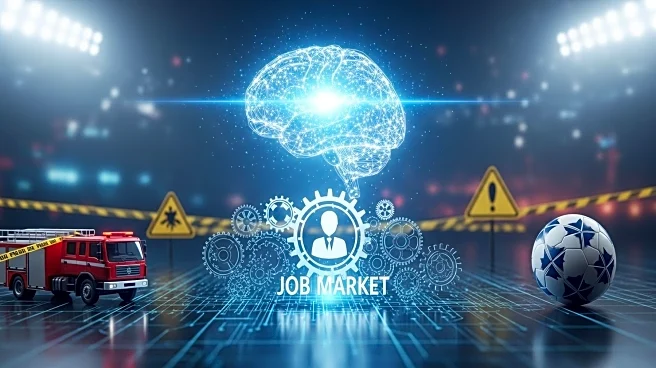What's Happening?
A recent study conducted by Stanford economists Erik Brynjolfsson, Bharat Chandar, and Ruyu Chen has highlighted the impact of artificial intelligence on entry-level employment. The research indicates that early-career employees in fields heavily exposed to AI have experienced a 13% drop in employment since 2022. This decline is attributed to the capabilities of generative AI tools, such as ChatGPT, which can perform tasks traditionally handled by these workers. The study specifically points to software engineering and customer service as areas where young workers are being supplanted by AI, with a 20% reduction in entry-level positions. In contrast, older workers in the same sectors have seen employment growth. The research utilized data from ADP, tracking employment changes among 25 million workers, and found that older employees possess communication and soft skills that are less likely to be replaced by AI.
Why It's Important?
The findings of this study underscore the disruptive potential of AI in the job market, particularly for younger workers. As AI technologies continue to evolve, they are likely to reshape employment landscapes, creating challenges for those entering the workforce. The study suggests that while AI can replace certain jobs, it also has the potential to augment roles, particularly in fields like healthcare, where it can take over routine tasks. This shift necessitates adaptation among workers, who must learn to leverage AI tools to enhance their productivity and remain competitive. The broader implications of AI's integration into the workplace include a reconfiguration of employment types and the need for workers to acquire new skills to thrive in an AI-driven economy.
What's Next?
As AI continues to permeate various industries, workers, especially younger ones, are encouraged to develop skills that complement AI technologies. The study advises young workers to learn how to use AI effectively to increase their productivity and value in the job market. Additionally, the ongoing evolution of AI may lead to further research and policy discussions on how to manage its impact on employment. Companies may increasingly seek to integrate AI in ways that support and expand employee roles rather than replace them entirely. The study's authors emphasize the importance of monitoring these employment effects as AI technologies advance.
Beyond the Headlines
The study highlights a broader cultural and ethical dimension regarding the role of AI in society. As AI technologies become more prevalent, there is a need to consider the ethical implications of job displacement and the responsibility of businesses to support workforce transitions. The potential for AI to create new job opportunities while rendering others obsolete raises questions about equitable access to training and education. Furthermore, the study suggests that older workers' tacit knowledge and experience may offer a buffer against AI replacement, pointing to the value of human skills that AI cannot replicate.









